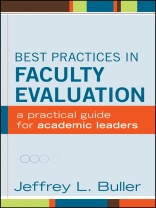BEST PRACTICES IN FACULTY EVALUATION
Best Practices in Faculty Evaluation is designed to be a hands-on guide for academics and administrators who want to become more effective and more confident in their handling of the important task of faculty evaluation. This vital resource offers chairs, deans, and members of evaluation committees the practical information they need to perform fair and accurate faculty evaluation.
The book covers best practices in all forms of review and evaluation and includes directions that are designed to help evaluators understand how to use the information about faculty performance, convey clear messages about priorities, and protect themselves in cases when an appeal or grievance is likely. Best Practices in Faculty Evaluation is filled with practical advice and answers to commonly asked questions about oral and written reviews and evaluations, annual performance appraisals and evaluations, probationary and pretenure reviews, posttenure reviews, merit evaluations, tenure evaluations, promotion evaluations, and much more.
In today’s complex academic environment there is no longer a ’typical’ full-time, tenure-eligible faculty member. The staff of most colleges and universities includes increasing numbers of part-time faculty members, non-tenure-track faculty members, and even online course instructors whom the reviewer never meets in person. To address the wide range of diverse faculty members, the author offers clear guidance for evaluating both tenure-tracked faculty and nontraditional faculty members.
Inhoudsopgave
The Author ix
Introduction and Acknowledgments xi
Part One: The Fundamental Goals of Review and Evaluation 1
1 The Accountability Culture in Higher Education 3
2 Best Practices in All Forms of Review and Evaluation 23
3 Oral and Written Reviews and Evaluations 43
Part Two: Primarily Formative Review and Evaluation 65
4 Annual Performance Appraisals and Evaluations 67
5 Probationary Period Pretenure Reviews 89
6 Posttenure Review 109
Part Three: Summative Review and Evaluation 129
7 Merit Evaluations 131
8 Tenure Evaluations 151
9 Promotion Evaluations 173
Part Four: Quantitative and Qualitative Approaches to Review and Evaluation 191
10 The Arreola Model 193
11 The Seldin Model 215
12 Incorporating Quantitative and Qualitative Approaches into an Integrated Process 229
Index 249
Over de auteur
THE AUTHOR
JEFFREY L. BULLER is dean of Harriet L. Wilkes Honors College, Florida Atlantic University. He is the author of Academic Leadership Day by Day, The Essential College Professor, The Essential Academic Dean, and The Essential Department Chair, 2nd Edition.












